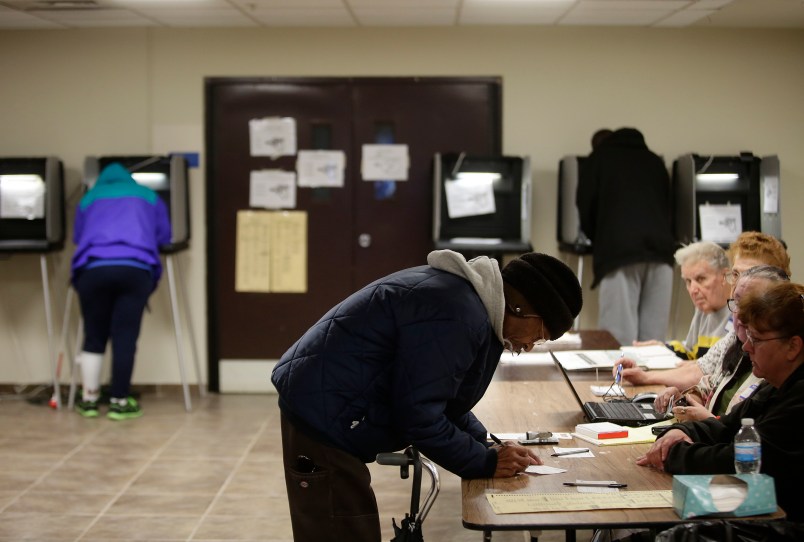Michigan Republicans have launched an effort to institute new voter ID restrictions by circumventing Democratic Gov. Gretchen Whitmer (D) entirely.
The plan, which has been brewing for months, requires the support of just 3.4% of Michigan’s population and the approval of the Republican-controlled legislature. And after a frustrating legislative session in which numerous proposed voting restrictions withered on the vine, Republicans are eyeing the tactic with new urgency.
The changes would come via a petition drive: If “Secure MI Vote,” a group led by Republican operatives, succeeds in collecting just 340,000 signatures — the legal threshold of 8% of the total votes cast in the last gubernatorial election — then the new restrictions would need only be approved by the legislative branch, avoiding Whitmer altogether.
Among the proposed changes: A strict photo ID requirement for in-person voting, new ID measures for mail-in voters, and a prohibition on elections officials sending out unsolicited absentee ballot applications.
“Extreme Republicans in this state, like they are in others, are trying to impose these restrictions that will have a real impact and actually prevent eligible voters from voting,” said Nancy Wang, executive director of Voters Not Politicians, which is organizing volunteers in opposition to the proposed restrictions.
“There is actually no evidence, and no need, for these unnecessary restrictions,” Wang said.
As reported by The Detroit News and other outlets Monday evening, Secure MI Vote has announced its plans to turn in its proposed petition language to the secretary of state’s office. A spokesperson for that office told TPM Tuesday morning that Secure MI Vote has not yet submitted the petition language. The Detroit News noted that the group’s initial treasurer, upon its founding in December, was the chief of staff to the chairman of the Michigan Republican Party.
Grant Hermes, a reporter for Detroit news outlet WDIV, circulated an outline of the group’s goals, including requiring that in-person voters provide a photo ID and that mail-in voters provide a driver’s license number, or state personal identification number, and the last four digits of their Social Security number.
Voters without sufficient ID would be forced to vote with a provisional ballot and provide proof of identity within six days — a change from the status quo, which allows registered voters without ID to sign an affidavit legally affirming their identity.
According to the outline, the proposal would also prohibit election officials from distributing unsolicited absentee ballot applications, and would also prohibit “outside corporate entities” from funding voting procedures — a nod to right-wing anger at a group funded by Mark Zuckerberg that provided grants to elections departments in 2020.
GOP consultant Jamie Roe told Bridge Michigan, “What we are trying to do here is just restore the confidence and the belief in the integrity of the system.”
Left unsaid: The reason many Americans have lost confidence in the system is not actual voter fraud schemes — which are vanishingly rare — but rather widespread lying about voter fraud for political gain from Donald Trump, Rudy Giuliani, and local Republican leaders.
“Even in 2020, when there was the largest turnout ever in the state, we did not see fraud through the use of absentee ballot applications,” Wang said. “There weren’t any of these outlandish claims that some of these lawyers are making, about dead people voting, or people who are applying for multiple absentee ballots — none of that was proven to be true.”
Notably, the petition drive has been under discussion for months, and the delay likely means any changes resulting from the effort won’t take effect until after the 2022 elections — unless Republicans hustle and collect all of their signatures in time for the secretary of state’s office to certify them this year.
Roe told Bridge Michigan, “We’re pretty hopeful and optimistic here that we can get this process moving quickly.”
Wang acknowledged that Secure MI Vote would likely collect the signatures it needed to get the measure before the legislature, but she was skeptical that it could happen by the end of the year.
“Unfortunately, there are that many people in Michigan that have bought into the Big Lie, and are really, really invested in this idea that they should be preventing people from voting.”



